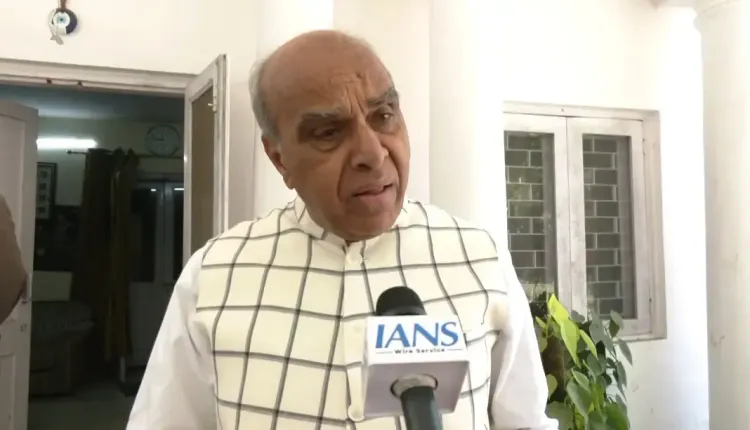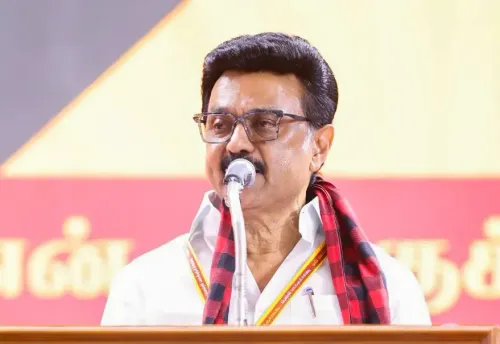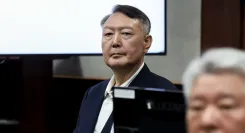JPC Chief Criticizes Political Motives Behind Eid Protests

Synopsis
Key Takeaways
- Protest against Waqf Amendment Bill during Eid celebrations.
- Jagdambika Pal's strong criticism of politicizing religious occasions.
- Calls for unity and peace during Eid.
- Concerns over the misuse of Ramadan for political purposes.
- The importance of presenting the amendment in Parliament first.
New Delhi, March 31 (NationPress) During the Eid celebrations, numerous Muslims were spotted donning black armbands while performing prayers in mosques located in cities such as Delhi, Sambhal, and Bhopal. This act, perceived as a protest against the Waqf (Amendment) Bill 2024, elicited strong condemnation from Jagdambika Pal, the Chairman of the Joint Parliamentary Committee (JPC). Pal challenged the political intentions behind this gesture, asserting that Eid should be dedicated to spiritual contemplation rather than political displays.
The All India Muslim Personal Law Board (AIMPLB) had previously called upon Muslims to wear black armbands during ‘Alvida Jumma’ prayers as a peaceful protest against the proposed Waqf Amendment Bill.
In a statement to IANS, Pal remarked, “It is Eid, and while people performed namaz, some chose to protest against the Bill by wearing black bands. I extend my congratulations to everyone on this significant occasion. Eid symbolizes brotherhood, forgiveness, and the mending of grievances. Why must we politicize this sacred day? The amendment Bill has yet to be introduced in Parliament.”
He further criticized the efforts to sow division on such a significant religious occasion: “During Ramadan, a month dedicated to worshiping Allah, why was there a call to wear black bands nationwide? Today is a day for prayer, not for political demonstrations. The government should first present the Bill in Parliament. If it serves the interests of the underprivileged and marginalized Muslims, it should be embraced. Yet, what we are witnessing is purely political maneuvering.”
Pal condemned the politicization of Ramzan, stating, “The entire month of Ramzan has been turned into a political battleground. Opposition figures such as Asaduddin Owaisi have been making statements, appealing to political leaders like Nitish Kumar and Chandrababu Naidu. Even Kiren Rijiju clarified that the amendment will not impact any mosque. Nevertheless, there’s an attempt to mislead the public. Are they attempting to create chaos or incite discord? Many Muslim organizations have voiced their support for the Waqf Amendment Bill.
“We have submitted our report. Now it is the government’s duty to advance the Bill as planned with the Joint Committee,” Pal added.
Pal also responded to West Bengal Chief Minister Mamata Banerjee’s recent comments, advising the public not to succumb to provocations that could incite communal violence. Banerjee criticized the BJP, questioning whether they would amend the Constitution if they had issues with minorities.
Pal replied firmly: “She neglects to recognize the festivals of Sanatan Dharma and even attempted to halt the events of the BJP state president, leading to police lathi charges. Her actions appear aimed at heightening tensions. The police in West Bengal are being politicized under the influence of the Trinamool, which could incite riots.”
Additionally, Pal reacted to Congress leader Sonia Gandhi’s vehement criticism of the National Education Policy (NEP) 2020. Gandhi accused the BJP-led government of utilizing the NEP to centralize authority, commercialize education, and communalize the curriculum.
Pal countered, “If they had analyzed the NEP accurately, they would understand that it promotes education in mother tongues alongside regional languages. The policy encourages multilingual education, providing flexibility for students to select languages such as Hindi, Tamil, Kannada, or English. The establishment of new IITs, IIMs, and educational hubs under this policy has granted Indian students global recognition, including in Silicon Valley.
Meanwhile, in an opinion piece published in The Hindu, Gandhi stated, "The Union Government's record over the past decade has convincingly shown that in education, it is focused solely on the successful execution of three core agenda items — the centralization of power with the Union Government; the commercialization and outsourcing of investments in education to the private sector, and the communalization of textbooks, curricula, and institutions."










